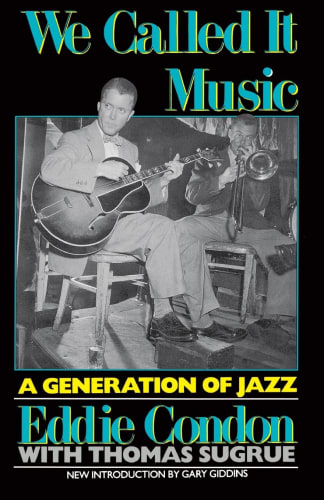
We Called It Music
Eddie Condon (1905–1973) pioneered a kind of jazz popularly known as Chicago-Dixieland, though musicians refer to it simply as Condon style. Played by small ensembles with driving beat, it was and is an informal, exciting music, slightly disjointed and often mischievous. The same could be said of Condon's autobiography, We Called It Music, a book widely celebrated for capturing the camaraderie of early jazz. Condon's wit was as legendary as the music he boosted. Here is Condon on modern jazz: "The boopers flat their fifths. We consume ours." On Bix Beiderbecke: "The sound came out like a girl saying yes." On the New York subway: "It was my first ride in a sewer." When his memoir was first published—to great acclaim—in 1947, he was well known as a newspaper columnist, radio personality, saloon keeper, guitarist, and bandleader. He was the ideal man to come up with an insightful portrait of the early days of white jazz, and his book offers nonpareil accounts of many of the jazz greats of that era, including Beiderbacke, Fats Waller, Jack Teagarden, Jimmy McPartland, Gene Krupa, Bessie Smith, Louis Armstrong, and Bing Crosby.These were the days when jazz was popularly associated with Paul Whiteman and Irving Berlin. Condon considered true jazz an outlaw music and himself an outlaw. He and his cohorts tried to get as close as possible to the black roots of jazz, a scandalous thing in the '20s. Along the way he facilitated one of the first integrated recording sessions.We Called It Music, now published with an introduction by Gary Giddins that places the book in historical context, remains essential reading for anyone interested in the wild and restless beginnings of America's great musical art, or in the wit and vinegar of Eddie Condon.
We Called It Music
